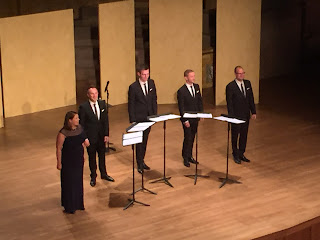Richardson
Auditorium, Princeton. Balcony Left (free).
Members
Anja Poche,
soprano; Sebastian Krause, counter-tenor; Tobias Poche, tenor; Ludwig Bohme, baritone;
Manuel Helmeke, bass.
Program: ALL THE
WORLD’S A STAGE - Shakespeare a Capella
The was the
fourth and last of the Princeton Summer Free Chamber Music series for this
season, and is the third one I attended.
The ensemble is all all-voice group, and I believe this
was my first encounter with a group like this (not counting the isolated
instances.)
The group at the end of the first half.
While I can
carry a tune, I don’t think I have as much appreciation of the voice as an
instrument as “instrument” instruments.
So my expectations weren’t that high when I sat down. Anne and I came away very satisfied, happy
that we went even though we couldn’t get tickets on line and had to drive to
Princeton without knowing if we would be turned away. Of course that wasn’t really expected as we
had never seen a full auditorium.
The selection of
music reminded me of yesterday Mostly Mozart concert. Yesterday the songs were picked because they
had to do with emotions. For today most
of the songs were selected because they were written to Shakespeare’s
lyrics. Many of them were arranged for
the quintet by one of the musicians in the group.
The Concert Program.
Each of the members
also took turn to talk a bit about the music, which added quite a bit of
appreciation when the songs were performed.
There were some musicological insights as well, but I frankly didn’t get
all of it, and in any case don’t remember much of it.
The one aspect
that was interesting to me was while the pieces range from being written in the
17th century (or even earlier) to the 20th, the “styles”
were not all that different. Take as an
exmaple the group of three songs chosen for their association with “Twelfth
Night.” One was written by Purcell, the
other two were written by the Finnish composer Jaakko Mantyjarvi (b. 1963) and
Nancy Wertsch (b.1943). If I hadn’t read
the program, I wouldn’t have placed the composers that far apart. Now that may just point to my lack of music
knowledge, but I certainly won’t make the same mistake with instrumental music,
or operas for that matter.
One reason I put
forward is one can make an inanimate instrument do all sorts of atonal
stuff. As long as you hit the right key
or have the finger in the right place, the music will come out. With a capella singing however, the artists
are limited by more natural intervals (I won’t go into the physics, but
octaves, fifths, and thirds are more natural than fourths and sevenths, for
instance.) With instruments provided a
reference (from an accompanist, for example), most competent musicians can get
the note right. However, if all you have
are other people’s voices, then the music has to be written more “naturally.” And perhaps all this is nonsense.
Each of the
individual voices was great, but when put together they just produced
incredibly nice music. Perhaps due to
their German background (the group hails from Leipzig), the singers for the
most part just stood there, but the coordination among them was simply
incredible, they all did their t’s and d’s and the same time, and ended their
notes at the same time.
While the songs
were sung in English (it’s Shakespeare after all), I had trouble with a lot of
the words. For encore they sang Brahms’s
Waldensnacht, in German of course. An
all-Shakespeare program for a first encounter is a bit on the heavy side, so
one wish I have is a more varied program so I could appreciate more the musical
range a vocal ensemble can provide.
There is
something about Princeton during the summer.
At 9:30 pm there were still lots of people out and about. Of course there was no one on Broadway when
we got back to South Amboy.


No comments:
Post a Comment